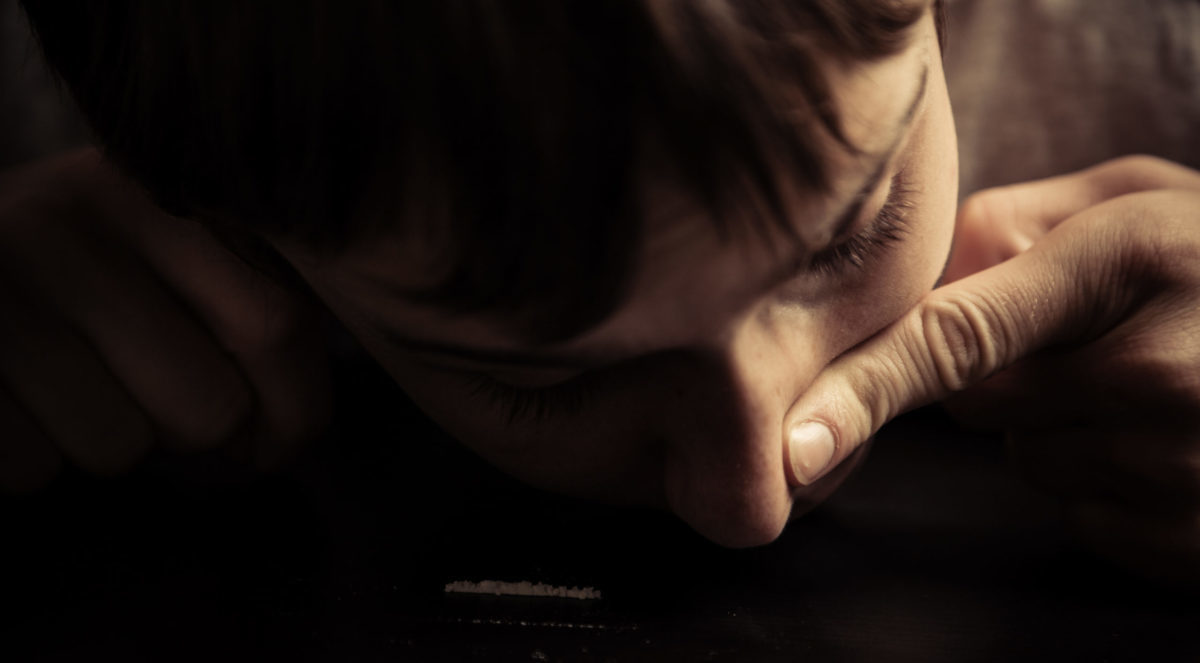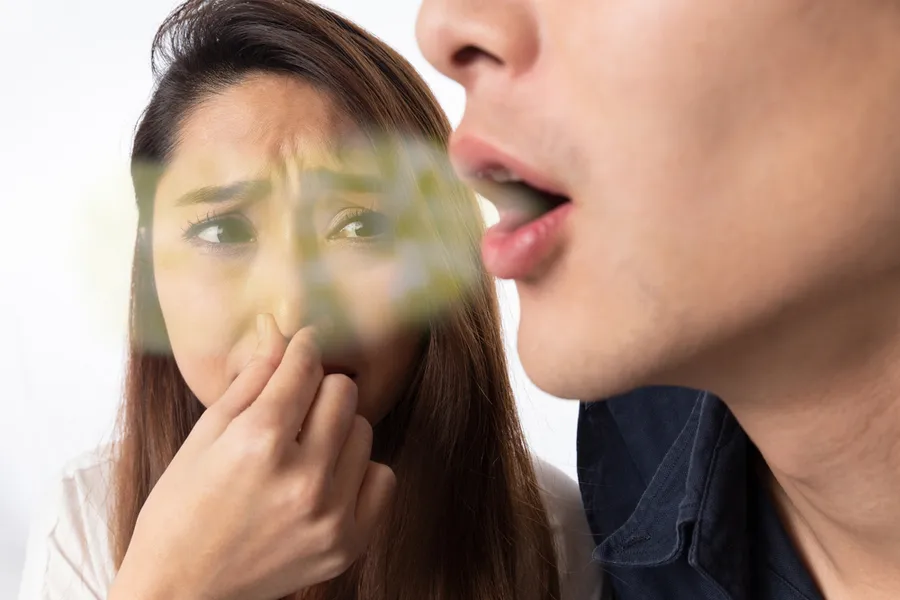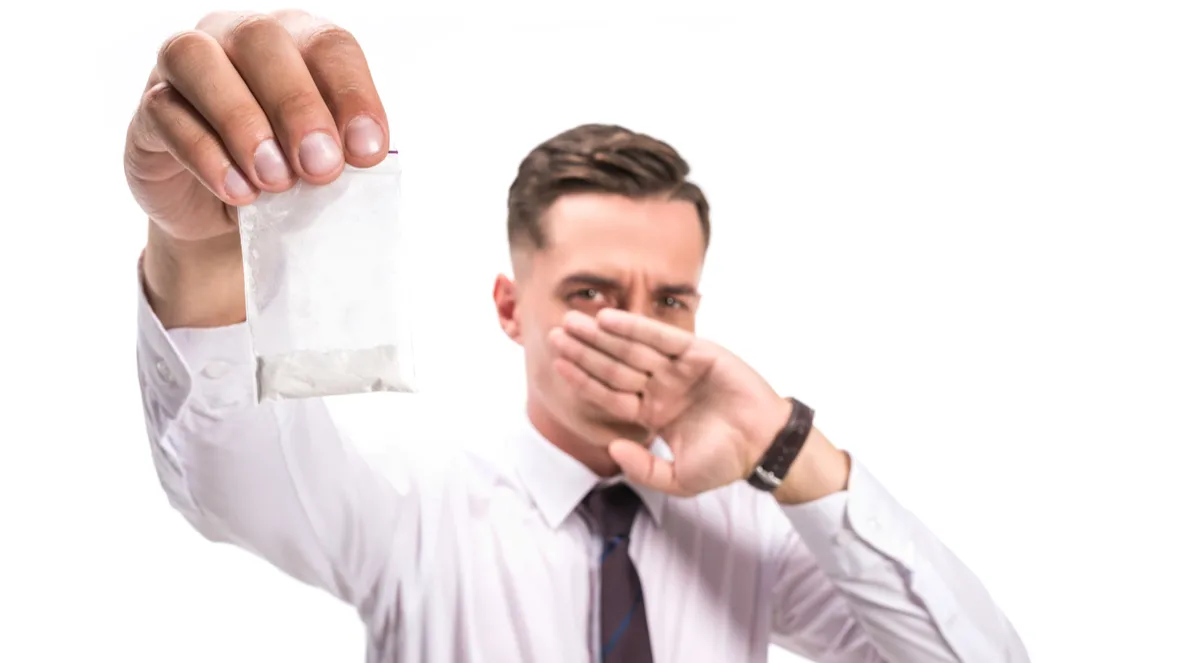Does Cocaine Use Cause Bad Breath?
The phrase cocaine abuse often conjures up images of powder trails, dollar bill straws, mirrors, and credit cards. We think of the 1980s when cocaine abuse was common and unquestioned. But many don’t realize that this illicit stimulant is staging a comeback.
From 1999 to 2019, fatal overdoses involving cocaine rose from 3,822 to 15,883. Cocaine is a powerful and addictive drug that can impair every aspect of life. From mental and physical health complications to financial and relationship troubles, its impacts know no bounds.
But it’s not just the major, life-changing events that cocaine abusers have to worry about. There are also everyday annoyances like hyperactivity and difficulty sleeping, and other side effects that land somewhere in between. One of those side effects is something called coke mouth.

Cocaine and Bad Breath
On top of its many other potentially uncomfortable, unpleasant, painful, or even fatal side effects, cocaine causes a troubling oral condition. For users who rub the substance over their teeth, cocaine and bad breath are intrinsically linked.
But bad breath is not the only oral concern when it comes to cocaine use. This bad breath is a symptom of a deeper and more concerning problem: dental decay. From bad breath to the loss of teeth, dental decay comes in varying stages and can cause many different problems.
Cocaine Effects on the Mouth
Users can snort, inject, smoke, or rub the substance over their teeth. The side effects that you experience can vary depending on the method you use, the dose, how often, and for how long. Coke mouth is a side effect that is unique to users who ingest cocaine orally.
Many users do this to produce a faster high. The short-term side effects of cocaine include euphoric feelings and increased energy and focus. But these side effects never last for long. And what comes next is not worth the tradeoff.
Cocaine’s effects on the mouth include:
- Bad breath
- Sores in and around the mouth
- Tooth decay (either from tooth and gum erosion due to rubbing cocaine there or from neglected hygiene due to cocaine use through other methods)
- Gingivitis and other oral diseases
- Wear to the teeth and jaw from grinding and clenching
- Tooth loss
Snorting cocaine can also interfere with your oral and nasal health. It can cause you to lose your sense of smell, promote nosebleeds, make it harder to swallow and cause regular hoarseness. It can also cause an overall irritation of your sinuses, which often results in chronic runny noses.
Other Symptoms of Cocaine Use
Different methods of cocaine use can cause different symptoms. Not all of them will be related to the mouth or sinuses. Other side effects of cocaine use include:
- Irritability
- Paranoia
- Hypersensitivity to touch, sound, and sight
- Bizarre or unpredictable behaviors
- Increased feelings of anger that may escalate to violence
- Constricted blood vessels and dilated pupils
- Nausea
- Fast or otherwise irregular heartbeats
- Increased blood pressure and body temperature
- Muscle twitches and tremors
- General feelings of restlessness
Smoking cocaine can cause asthma, respiratory distress, and a higher risk of infections. Injecting cocaine puts you at a higher risk of contracting hepatitis C, HIV, and other diseases, as well as infections, scarring, and collapsed veins.
Over time, left untreated, the side effects of cocaine use only get more severe. It also becomes more likely to suffer life-threatening health impairments and a fatal or non-fatal overdose.
How Addictive is Cocaine?
Cocaine is a Schedule II drug, which means that it has a high risk for abuse and addiction. The Drug Enforcement Agency (DEA) maintains that using cocaine has the potential to lead to severe psychological or physical dependence. Schedule II drugs are considered dangerous.
Other drugs in the Schedule II class include:
- Vicodin
- Methamphetamine
- Methadone
- Hydromorphone or Dilaudid
- Demerol
- Oxycodone or OxyContin
- Fentanyl
- Dexedrine
- Adderall
- Ritalin
As the drug class numbers get lower, they get more dangerous. This means that there is only one class of drugs considered more dangerous or with a higher potential for abuse and addiction.
Schedule I drugs have no currently accepted medical uses and a high potential for abuse. These drug classifications are there to shed light on the potential dangers of different drugs. Certain Schedule II drugs may have accepted medical uses in the appropriate doses, but they are still considered addictive and dangerous.
And cocaine is not one that has approved medical purposes in the United States today. Illicit drugs have been more carefully regulated since the drug trade boom of the 80s, but it is still difficult to regulate them fully.
How to Prevent Bad Breath from Cocaine
The best way to prevent bad breath, tooth decay, and other oral health problems is to stop using cocaine. For many people, this may be easier said than done. But we are here to help. It can be hard to change your life, but it is always worth the effort. A happier, healthier, sober life is a recovery program away.
Treatment for Cocaine Addiction
Treatment for cocaine addiction starts with a detox. At Best Rehabs In Arizona, we offer personalized detox programs to suit your unique addiction, withdrawal symptoms, and needs. There are three stages to every personalized detox:
- Evaluating your situation
- Stabilizing your condition
- Getting you ready for primary treatment
Personalized and professional drug detox is an excellent first step in the recovery process. Drugs that are as powerful and addictive as cocaine often comes with troubling and overwhelming withdrawal symptoms.
We can help you manage and overcome these symptoms so that you can stay strong and focused through the vital stage of early sobriety.
What Happens After the Detox?

Cocaine detox takes an average of one week. This timeframe and the severity of your withdrawals can vary depending on how long you were using cocaine, how frequently, and how much each time.
We will guide you through your detox to ensure that you stay safe, strong, comfortable, and hydrated. After your detox, we will help you evaluate your options and decide if you are better suited for one of our personalized inpatient or outpatient programs.
Inpatient programs are generally best for patients with moderate to severe addictions and overwhelming or otherwise concerning withdrawal symptoms. Those who are surrounded by drug triggers and temptations could also benefit from a change of pace.
Those with milder addictions, more manageable withdrawal symptoms, support at home, or work or family obligations that prevent a full-time stay are better suited for outpatient programs. But it is not always easy to tell which program will work best for you.
We do not expect you to have the answers already or face your recovery on your own. Our team of addiction experts will guide you through making this decision.
Best Rehabs In Arizona
Today is a great day to make a change. When you choose Best Rehabs In Arizona, you never have to walk the road to recovery alone. Our compassionate and knowledgeable teams, comfortable facilities, and personalized programs have helped thousands change their lives.
Now, it is your turn. Call our addiction counselors today at 866-576-4892 to get started. They are on call to answer your questions, verify your insurance, and start your intake.


